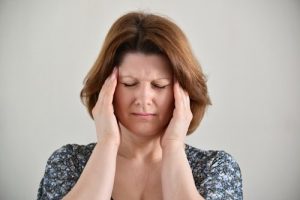
Headaches during menopause can take three forms—migraines, tension headaches, and sinus headaches. The most intense of these are migraines that typically cause pulsating pain on one side of the head and sometimes is accompanied by nausea. Headaches of moderate intensity are tension headaches due to stress, and sinus headaches are caused by inflammation or congestion.
While the exact link between headaches and menopause is not clear, doctors believe that an imbalance of hormones during menopause can trigger these headaches.
Can menopause cause headaches?
Women create two main sex hormones during their fertile years—estrogen and progesterone. Estrogen regulates the menstrual cycle and the maturity of eggs while causing blood vessels to dilate. Progesterone is active in the second half of the menstrual cycle and helps the uterus prepare for the fertilized egg. It also regulates blood flow by causing blood vessels to tighten.
During menopause, the production of these hormones fluctuates and gradually declines until the female body stops producing them. These changes affect the contraction and expansion of blood vessels and result in pressure fluctuations. These pressure fluctuations result in headaches. Therefore, menopause and headaches are related.
Reduction in progesterone and estrogen is not always consistent. During perimenopause (the period before full-fledged menopause), most women experience more recurrent and intense headaches. This is particularly true for those who have experienced hormone-related headaches during their menstrual cycle.
Sometimes, women who have never had hormonal headaches start to experience them.
During menopause, migraine-type headaches are more common. After menopause, headaches usually reduce as the hormone levels remain low and do not fluctuate.
Menopause headaches treatment
Several prescription and over-the-counter medications are available to treat and prevent migraines. Diet and lifestyle changes are also recommended for menopause and headache treatment.
Doctors believe that certain foods may trigger headaches. Women should maintain a food diary to identify patterns and common triggers. Most often, caffeine, chocolate, alcohol, and dairy products are the triggers, and avoiding these can give menopause headache relief.
It’s also recommended to exercise three times a week for at least 30 minutes a day. Women going through menopause are suggested to take walks, swim, or take spinning classes. However, it is advised to build-up fitness gradually and not directly engage in high-intensity workouts, as this could spark a headache.
Sometimes, insufficient water intake can also cause a headache. Women experiencing headaches should monitor their water intake stay hydrated.
Natural remedies for menopause headaches
These include eating foods and consuming herbs that can alleviate symptoms and reduce the headaches.
Food such as apples, cherries, potatoes, rice, wheat, and alfalfa stimulate estrogen levels. Consuming more of these can give menopause headache relief.
Hormonal imbalance can also be treated using herbs like black cohosh, which contains estrogen, while non-estrogenic herbs can help to balance out hormonal levels.
So, does menopause cause headaches?
Medical experts believe that hormonal changes cause pressure fluctuations leading to headaches. These can be treated by medication as well as natural remedies and lifestyle diet changes. Monitoring water and food intake, keeping a diary to identify which foods are triggers, and regular exercise help to alleviate menopause headaches.
Also read: Essential oils for menopause: Usage, risks, and recipes